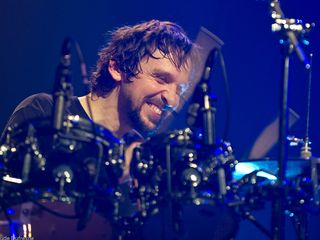
Marco Minnemann picks 13 essential drum albums
With almost 20 years of recordings under his belt, including those with Paul Gilbert, Mike Keneally, Eddie Jobson and Steven Wilson, as well as a pair of studio discs by his own band, The Aristocrats (their newest, Culture Clash, hits in July), drum virtuoso Marco Minnemann has more than a few albums bearing his name that fellow sticksmen would deem 'essential.'
Asked what distinguishing factors he looks for in a great drum record, Minnemann says it's more about sound and spirit, along with an unpretentious approach to musical unity, rather than the usual chops a-plenty. "For me, if the drummer has really aimed high compositionally or sonically and contributed to the uniqueness of an album, that's a bigger deal than flashy playing," he says.
As it is with people, Minnemann asserts, character counts. “It’s all about personality," he says. "You don’t have to overplay to make a statement. Records by Queen and, of course, The Beatles, didn’t have wild drumming, but you can tell right away who's siting behind the drums. That's more meaningful than anything I can imagine."
In compiling his list of 10 Essential Drum Albums (which he stretched to a nice and even 13), Minnemann discovered that the old adage 'a band is only as good as its drummer' proved to be indeed true. "Interesting players flock together, definitely," he says. "All of these albums have drummers who are very creative and exciting. A great drummer helps make a great band, and together they'll make music that you want to listen to."
On the following pages, Minnemann runs down his picks for 13 Essential Drum Albums (listed alphabetically by artist). Drumroll, please...
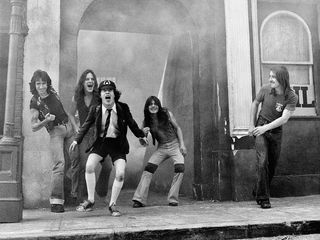
AC/DC - Highway to Hell (1979) and Back In Black (1980)
“The simplicity and concepts in Phil Rudd’s drumming are unbelievable. Only he could have fit with the band and the music they were making at the time. And maybe for all time: The band tried a couple of other drummers, but they came back to Phil. Once he was playing in them again, the AC/DC sound was there.
“His cymbal placement and the particular way he hits them are pretty important. He gets such a great tone. I think that’s what he band was really concerned with, having that impact. It’s not about fancy fills and flash playing; it’s minimal playing and very tight drumming. But wow, what power!”
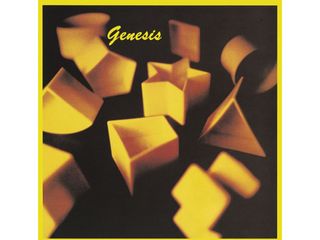
Genesis - Genesis (1983)
“Because he does so many things brilliantly, and because he’s been so commercially successful, people forget about Phil Collins as a drummer, which is a shame because he's brilliant. The way he composes his parts, and the sounds he gets, it’s truly remarkable.
“He’s playing concert toms on the song Mama, and they sound so unique, so resonant. They don’t have bottoms on them – not a lot of people use them – but Phil really made them sing. It’s a defining sound.
“Just A Job To Do is another great one. Phil made fantastic pop music with Genesis, but it was always interesting for musicians; there were cool grooves and parts that would perk up your ears all the time.
“Phil is almost like John Bonham to me: I hear his personality, his perspective. And, of course, there’s what he did on In The Air Tonight. It's not on this album, but still, everybody knows that drum part by heart. How many people can say they have a fill like that? Ten notes that everybody knows. Phil is a insanely talented drummer.”
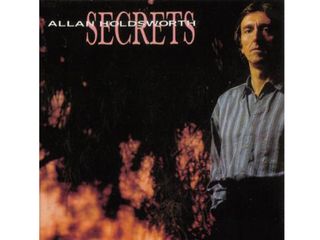
Allan Holdsworth - Secrets (1989)
“Vinnie Colaiuta really shines on this album. In a way, he overplays here, but he’s so amazing that it doesn’t matter. He just lets loose. And the whole album is kind of built that way, as if somebody said, ‘OK – go!’ It’s like a constant drum solo accompanied by other music. It works.
“There’s a song called City Nights, and it’s another one where I can play every fill, even though it was just one take. I think it was one of those great moments where they were able to capture magic. Vinnie plays beautifully on so many records – Joe’s Garage is a masterpiece – but I really admire what he does on Secrets. It's full of personality and spirit.”
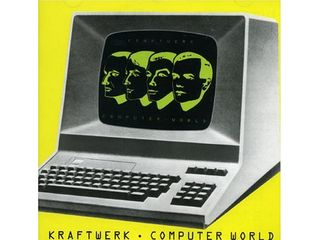
Kraftwerk - Computer World (1981)
“It’s probably my favorite Kraftwerk album. I even use the song Numbers in my clinics and solo over it. It’s so powerful and unique. This is something that really matters to me.
“It’s not always the flashy playing and incredible technique that matters; it’s the ideas and the originality – that’s what matters. Nobody sounded like Kraftwerk, so right there, they’re original. They built their own instruments to get this machine-like groove. It wasn’t really quantized; it was more like they tried to be robots, playing really tight.
“Even on their latest record, Tour De France, they kept it going. It’s very inspiring for me to hear stuff like this, and I think it definitely belongs on a list of drum albums. Kraftwerk were playing their beats – it just wasn’t on drum sets. Hey, that counts.”
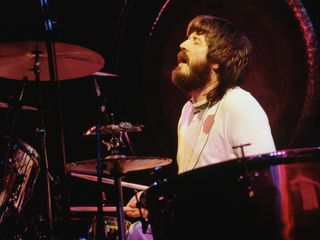
Led Zeppelin - Houses Of The Holy (1973) and Presence (1975)
I heard Houses Of The Holy and Presence before any other Zeppelin albums; I was about eight or nine years old at the time. I remember some friends of my parents had this sort of high-class restaurant, and one day they said to me, ‘Do you know this band Led Zeppelin?’ And I didn’t, not yet anyway, so I said, ‘No, no, I don’t.’ They said, ‘The group was in our restaurant the other night, and they really annoyed the other customers. They were carrying on and being so loud and out of control – it was crazy!’
“I thought, ‘Wow, that’s pretty cool. I’ve got to ask my dad about them.’ My dad is a huge music lover, so I asked him if he knew Led Zeppelin. ‘Absolutely!’ he said. ‘I’ve got some records – here, check ‘em out.’ He gave me Houses Of The Holy and Presence.
“I put on Houses Of The Holy first, and of course, it starts out with The Song Remains The Same. ‘Oh, my God! What the fuck is that?’ [Laughs] It was like a UFO had landed or something. It sounded so good; the music just locked up so tight. That really stuck out to me and made me think, ‘Wow, that drummer, he’s really holding everything together – in a big way.’
“The bands I liked before, KISS and Queen, were never really drummer focused, although I love my Queen records. But with Zeppelin, it was like, ‘Oh, my God. There’s a guy who really plays solid and gets a good sound.’ John Bonham had everything. I wasn’t even a drummer at the time, but I completely got it.
“Presence is quite a cult album. Most of the real musos love that album. Robert Plant once mentioned that it sort of defined the Zeppelin sound. And what about Achilles Last Stand? My God, just that one song along is ridiculous! Listen to Bonham’s fills. This is unbelievable stuff.”
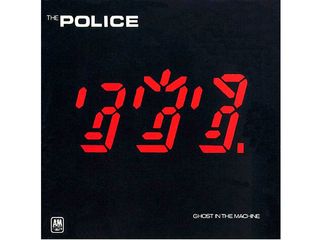
The Police - Ghost In The Machine (1981)
“It’s so hard to pick a favorite Police record, but I think that Stewart Copeland really shines on this one. A lot of it sounds very jam-like. You can tell that the songs are composed mainly to the basslines. Too Much Information, Demolition Man, One World (No Three), Hungry For You – it’s all coming from the bass.
“One World is a song I like to play along to. Each and every little fill that Stewart does, I can play it all from beginning to end. It’s just so strong and memorable. And the funny thing is, Stewart even told me, ‘Oh, that was a jam session. We just wound up using it.’ It’s one of those great moments where it all worked. There was spontaneity there, but there was also creativity and taste.
“The uniqueness and character in Stewart’s drumming is equal to so many great composers, because he is a composer. Nobody sounds like him. He has a spirit, a sound, a point of view.”
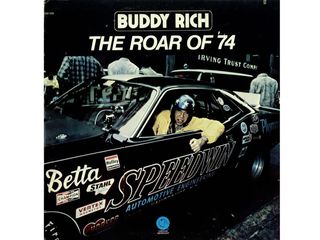
Buddy Rich - The Roar Of '74 (1973)
“I love this record, maybe because it was my introduction to Buddy Rich. There’s a song on it called Time Check, and Buddy plays brilliantly on it. He’s always great, but he’s in such a special place on that song. I covered it with the original Buddy Rich big band on one of my DVDs. It has such a driving force.
“One thing that I like about this record is that it’s a little experimental: Buddy had electric guitars on it, some funk rhythms – he expanded his reach. But there’s some essential Buddy songs on it, too, like Nuttville. The way he controlled the band on that song was remarkable.
“Of all the albums on my list, this is probably the only one that’s truly focused on the drums. Buddy was the center of the music; everything kind of revolved around him, as it should have. He was an honest and true technical maestro.”

Pete Townshend - White City: A Novel (1985)
“Simon Phillips! His playing on this record is amazing, and what he’s doing on the song Give Blood is unreal. Every fill is fantastic, every part is performed to perfection. If they gave out Grammys for drumming, Simon should have gotten one for this record. The way he plays off of David Gilmour’s guitar work – it gives me shivers to even think about.
“Actually, what’s funny is that Simon didn’t even know he was playing with Gilmour at the time. He did the session, and then he went home and told his wife about it. ‘Hey, I did this really great session today,’ he said. ‘The guitar player was so cool, and he had amazing tone.’ He described what the guy looked like to her, and she went, ‘Could that have been David Gilmour?’ Simon went back to the studio the next day and saw a briefcase that had the name on it: David Gilmour. He couldn’t believe it!
“There’s another track on the record called Face To Face, and man, that has some deep shit, as well. It swings like crazy and grooves like mad. It’s hard not to feel happy when you hear it. Everybody in the drum community was listening to this when it came out.”
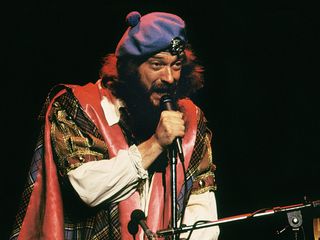
Jethro Tull - Bursting Out (1978) and A (1980)
“Bursting Out is a live record that really captures the band at their best. Barriemore Barlow is the drummer, and he’s absolutely fantastic. What he does on the kick drum and with his fills is astonishing – and really ahead of its time, in my opinion.
“There's a drum solo that he plays in the song No Lullaby that is so good, so tasteful. To me, the band was at its peak during this period. I think that even John Bonham mentioned Barriemore as his favorite player at the time.
"However, there’s another Jethro Tull drummer that I want to mention, and that’s Mark Craney, who plays on the A album. He has great control, great ideas, phrasing, grooves – fantastic. I don’t think anybody had heard of him until this album, but he did a fantastic job. He went on to play with John-Luc Ponty and Tower Of Power – a really solid drummer. But A was the first time I heard him, and he really impressed me.”
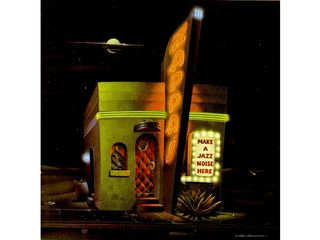
Frank Zappa - Make A Jazz Noise Here (1991)
“Chad Wackerman played on Frank’s 1988 tour, which this is from. They put out a few records of that tour. I remember being a teenager and playing along to Side Two of this record, where it was all the heavy stuff, and just being blown away. It’s The Black Page, Sinister Footwear, all amazing stuff.
“I was really into this music at the time, and it made a real impact on me. Frank was such a phenomenal composer, and his music had to be executed by players who could really interpret his stuff just right. Chad obeyed Zappa’s compositions without overplaying – the right notes at the right time – but he did it with tremendous feel and creativity.”

Joe is a freelance journalist who has, over the past few decades, interviewed hundreds of guitarists for Guitar World, Guitar Player, MusicRadar and Classic Rock. He is also a former editor of Guitar World, contributing writer for Guitar Aficionado and VP of A&R for Island Records. He’s an enthusiastic guitarist, but he’s nowhere near the likes of the people he interviews. Surprisingly, his skills are more suited to the drums. If you need a drummer for your Beatles tribute band, look him up.

“It didn’t even represent what we were doing. Even the guitar solo has no business being in that song”: Gwen Stefani on the No Doubt song that “changed everything” after it became their biggest hit

"There was water dripping onto the gear and we got interrupted by a cave diver": How Mandy, Indiana recorded their debut album in caves, crypts and shopping malls

“It didn’t even represent what we were doing. Even the guitar solo has no business being in that song”: Gwen Stefani on the No Doubt song that “changed everything” after it became their biggest hit

"There was water dripping onto the gear and we got interrupted by a cave diver": How Mandy, Indiana recorded their debut album in caves, crypts and shopping malls
Most Popular






